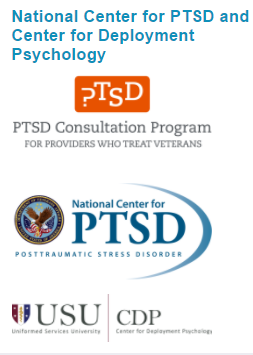The PTSD Consultation Program at the National Center for PTSD and the Center for Deployment Psychology are offering a free training in Prolonged Exposure to help make evidence-based treatment for PTSD more available to Veterans in rural areas. This three day workshop will be held 6-8 June 2019 in Helena, MT. This workshop will be led by Dr. Lisa-Ann.Cuccurullo, and Dr. Kevin Holloway. Non-VA Licensed mental health providers who regularly treat Veterans or those who intend to treat Veterans can apply.
 Participants will also need to apply to and be accepted by the Emory University Prolonged Exposure Consultant Training Program in order to receive post-training consultation. Details will be provided after you receive your confirmation letter.
Participants will also need to apply to and be accepted by the Emory University Prolonged Exposure Consultant Training Program in order to receive post-training consultation. Details will be provided after you receive your confirmation letter.
The cost of transportation, food, and lodging is not included. Discounted hotel rooms will be available.
Please note, completing the registration does not mean you are registered. A confirmation letter will arrive in the next 7 days. We appreciate your patience, and thank you for your interest in CDP programs.
Questions may be addressed to Mr. Micah Norgard mnorgard@deploymentpsych.org
Part 1: Assessment (.5 day) This segment of the workshop will review a method for screening, assessment, and treatment outcome monitoring of Posttraumatic Stress Disorder (PTSD) centered on the use of the PTSD Checklist for DSM-5 (PCL5). Participants will be introduced to VA/DOD best practices for diagnosing military-related PTSD including screening for trauma-related disorders, obtaining thorough military and trauma histories, conducting a semi-structured diagnostic interview, and using self-report measures to track treatment outcome. DSM-5 diagnostic criteria for PTSD as well as Other Unspecified Specified Trauma and/or Stressor Related Disorders are reviewed. Tools for assessing PTSD and common comorbid conditions are discussed including appropriate use of the PCL 5, Life Events Checklist 5 (LEC 5), Patient Health Questionnaire-9 (PHQ-9), and Alcohol Use Disorders Identification Test-Consumption Questions (AUDIT-C). Semi-structured clinical interviewing techniques are reviewed and then practiced by participants for the intended purposes of screening, diagnostic assessment, and tracking treatment outcome. Unique variables that can impact the assessment and feedback process with a military population are identified. Role-plays and demonstrations will be used to help develop participants’ PTSD assessment skills
Part 2: Prolonged Exposure Therapy (PE) for PTSD (2.5 days) This segment of the workshop provides training in Prolonged Exposure (PE) Therapy, an evidence-based treatment for PTSD described in the manual, Prolonged Exposure Therapy for PTSD – Therapist Guide, by Foa et al., 2007. It covers the empirical and theoretical support for PE and reviews the main clinical techniques used in this structured protocol. Step-by-step instructions for conducting PE therapy sessions, including in vivo and imaginal exposure, along with strategies for working with over- and under-engaged patients and other difficult cases, are shared. Videotaped examples of PE cases are used to demonstrate therapist skills. Participants are expected to do role-plays in class to practice PE techniques, and they must attend all three days. Instructions to obtain consultation and continued learning will be reviewed at the close of the workshop.
Learning Objectives:
- Apply the VA/DoD Guidelines for the Assessment of Trauma and PTSD Discriminate between symptoms of PTSD and other disorders based on the DSM-5
- Facilitate the screening, diagnostic assessment, and tracking of treatment outcomes in PTSD patients using the PTSD Checklist for DSM-5 (PCL-5)
- Communicate results of diagnostic assessments as well as treatment outcome measures to clients.
- Apply assessment outcomes to inform case conceptualization and treatment planning.
- Articulate theoretical underpinnings of PTSD regarding the connection between reported symptoms and specific treatment components of Prolonged Exposure therapy.
- Develop a theoretical conceptualization of a client’s PTSD symptoms to guide treatment planning.
- Communicate a rationale for Prolonged Exposure Therapy that builds rapport,improves client motivation, and increases treatment adherence.
- Teach clients how common reactions to trauma relate to the symptoms of PTSD and demonstrate how these reactions impact their current functioning.
- Teach clients a method of breathing that reduces their arousal and promotes distress tolerance.
- Construct an individualized avoidance hierarchy designed to systematically confront core fears.
- Implement in vivo exposure to block trauma related avoidance.
- Facilitate imaginal exposure to reduce the intensity and frequency of PTSD symptoms.
- Manage the client’s emotional engagement to increase the effectiveness of imaginal exposure.
- Structure homework assignments that deepen exposure based learning and further treatment goals.
- Focus on “hot spots” in the memory to more efficiently reduce the intensity of symptoms.
- Analyze exposure exercises to facilitate new learning and modify client’s unhelpful, trauma-based cognitions.
- Incorporate new learning to revise unhelpful cognitions that promote avoidance and maintain symptoms.
- Assess Prolonged Exposure Therapy outcomes using standardized procedures, and use assessment data to refine ongoing intervention.
- Adapt exposure techniques in a theoretically consistent manner to improve accessibility and clinical outcomes for specific patients.
- Teach procedures for relapse prevention and communicate rationale to promote continued applications of skills gained.
CE Details:
Mental healthcare providers are eligible to receive 21 CE credits upon successful completion of a post-training survey/knowledge evaluation. CEs for partial participation will not be awarded. CEs will be provided through PESI, Inc via email two to four weeks after the training.
For more information, including eligible disciplines and recognizing organizations, please click here.
For additional CE information only, please contact Bridget Schuab at bschaub@pesi.com.

